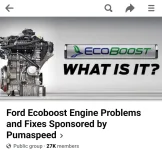I thought the 2GR-FKS was dual injection (MPI+GDI). It seems it still suffers from fuel dilution?It seems GDI’s are the worst offenders for fuel dilution? This is specifically why I will not go to a 10k OCI in my DI Toyota 2GR-FKS engine.
You are using an out of date browser. It may not display this or other websites correctly.
You should upgrade or use an alternative browser.
You should upgrade or use an alternative browser.
Conclusions on Ecoboost Engine Oil - Gas Turbo Direct Injection
- Thread starter Navi
- Start date
Even in the presence of fuel dilution?Lower viscosity spread or little to no VII I think would be more ideal.
It may help a little.Even in the presence of fuel dilution?
I meant as opposed to going up a grade (or even mixing with a higher grade to increase viscosity).It may help a little.
SammyChevelleTypeS3
$50 site donor 2023
A shame as my dad and I both bought Ford and even some GMC trucks over the years and some of those Fords. I swear seemed you could not kill on purpose if you tried. Bronco full size 4wd plus F150s etc..... I put my Ford Bronco 302cui Xlt thru pure hell and back pulling boats, trailers, up and over hills and thru all kind of stuff hunting / fishing and even on 1200 - 1500 mi vacation trips. I did rebuild the entire front end , then drove it to neigborhood shop to align it one time after a pretty tough year. Engine work was ONLY an ocassional tune up. One of my all time fav vehicles. Those Fords for me, till about 1998 were like the ever ready bunny.... kept going and going......'Member when we believed in "Built Ford Tough" commercials. Pepperidge Farmtog remembers.....
As the owner of an ecoboost engine I use Supertech full synthetic 5w30 and change it often, usually between 4,000 and 5,000 miles. The oil always has reaked of gasoline from day one, so I decided that the best thing I could do is do short oil change intervals and use top tier fuel. Seven years later the engine runs great, plenty of power and no complaints really.
Whoa there, BITOG expects twice that2013 Ford Focus...130K/11 years....5W20...most reliable lowest cost to own I've ever had. Yes...built Ford Tough.
There is no measuring stick for what BITOG expects. 500K mi on xW20 and it craps the bed? OMG THIN OIL IS WHY SHOULD HAVE USED M1 0W40Whoa there, BITOG expects twice that
Last edited:
- Joined
- Sep 26, 2010
- Messages
- 9,837
The jury is still out on my 2.7L EcoBoost. I have changed the oil three times now--once at 1K miles, once at 2K miles, and again at 5K miles. This engine has both MPI (low speed operation) and DI (high speed operation) injection and despite the vast majority of those miles being on the open road which should equate to less fuel dilution, that is not the case for the first two UOAs (waiting on the third).
I use Polaris who uses gas chromatography for determining fuel dilution and mine was 2.5% and 2.4% respectively. I am hopeful that it will improve substantially as the miles are stacked on. Motorcraft 5W-30 (Factory Fill) did not stay in grade and was already an xW-20 in 1K miles.
The Mobil 1 ESP remained in grade, but had already dropped almost 11% viscosity in 1K miles. Waiting on the results from the 3K run to see how it fared.
One thing is certain, if things do not improve, I will not be running long OCs on this engine.
I use Polaris who uses gas chromatography for determining fuel dilution and mine was 2.5% and 2.4% respectively. I am hopeful that it will improve substantially as the miles are stacked on. Motorcraft 5W-30 (Factory Fill) did not stay in grade and was already an xW-20 in 1K miles.
The Mobil 1 ESP remained in grade, but had already dropped almost 11% viscosity in 1K miles. Waiting on the results from the 3K run to see how it fared.
One thing is certain, if things do not improve, I will not be running long OCs on this engine.
Last edited:
The jury is still out on my 2.7L EcoBoost. I have changed the oil three times now--once at 1K miles, once at 2K miles, and again at 5K miles. This engine has both MPI (low speed operation) and DI (high speed operation) injection and despite the vast majority of those miles being on the open road which should equate to less fuel dilution, that is not the case for the first two UOAs (waiting on the third).
I use Polaris who uses gas chromatography for determining fuel dilution and mine was 2.5% and 2.4% respectively. I am hopeful that it will improve substantially as the miles are stacked on. Motorcraft 5W-30 (Factory Fill) did not stay in grade and was already an xW-20 in 1K miles.
The Mobil 1 ESP remained in grade, but had already dropped almost 11% viscosity in 1K miles. Waiting on the results from the 3K run to see how it fared.
One thing is certain, if things do not improve, I will not be running long OCs on this engine.
View attachment 191503
2.5% fuel dilution is really minor and nothing to worry about. Honda 1.5 TGDIs seem to clock in above 5% regularly yet seem to live long lives. Nothing wrong with abbreviated OCIs, but as a Honda owner I’d be delighted with your fuel dilution results.
- Joined
- Sep 26, 2010
- Messages
- 9,837
2.5% dilution in 1,000 miles is not what I would call minor.2.5% fuel dilution is really minor and nothing to worry about. Honda 1.5 TGDIs seem to clock in above 5% regularly yet seem to live long lives. Nothing wrong with abbreviated OCIs, but as a Honda owner I’d be delighted with your fuel dilution results.
7500 miles, sure, 1000 miles, no.
What does industry state as the limit for fuel dilution for gasoline engines? I thought it was about 2.5%?
@High Performance Lubricants has stated >5% is their condemnation point2.5% dilution in 1,000 miles is not what I would call minor.
7500 miles, sure, 1000 miles, no.
What does industry state as the limit for fuel dilution for gasoline engines? I thought it was about 2.5%?
- Joined
- Sep 26, 2010
- Messages
- 9,837
Good to know--i need to check on that because I thought I read a Lubrizol paper that noted 2.5%. Will see what the 3K run shows and go from there.@High Performance Lubricants has stated >5% is their condemnation point
For me it is more about the oil remaining in grade given that I have twin turbochargers. Motorcraft oil is clearly not the way for me.
Then why do they put a 12 month battery in new cars? I bought a new mini van and the battery went dead after 2 years. I pulled it out and it had 12 months on the hidden side.Stop the consipracy madness of "They just want to get you to the end of the warranty period." - there is absolutely zero evidence of this. I have a 11 year old DI (not turbo) car I bought new, 5W20, 130K, runs like new, never needed de-carboning etc.
How does anyone get any info on failed engines? Yet that is used in many arguments on this board.Finally! We can agree on almost everything. The one thing I would say is still questionable (and seems to be proven out by the lack of failed engines) is what someone mentioned earlier. Your 5w30s diluted/sheared down into a 20 grade, but there was no appreciable increase in iron.
I am on board with your statement that essentially any 5w30 from WM will give similar results; that’s the point of specifications and certifications.
May I ask (completely uncombatively) why you’re so against trying HPL? You’ve already shown you’re willing to do numerous UOAs; why not put the HPL in and sample on a 3k basis and track viscosity and “wear” metals, and see how far you can go? @wwillson has gone well over 25k OCIs in two vehicles; what’s to lose (other than the cost of one oil change) by trying the HPL?
You’ve already done the hard work of proving to yourself that all shelf stock oils produce similar results; now if you choose something that’s markedly different, you should see different results. If you get the same results, I’ll be the first to say “nice work, you proved your theory.”
With all the things that people ramble on about on this board without data, if a member or their neighbors were to have a failed engine, we’d hear about it.How does anyone get any info on failed engines? Yet that is used in many arguments on this board.
Not saying there aren’t engines that are past sane operational status, sure. But most people either keep adding oil or sell it while they can.
- Joined
- Dec 4, 2023
- Messages
- 15
I believe the speed of the vehicle has nothing to do with determining which fuel injection method to use.The jury is still out on my 2.7L EcoBoost. I have changed the oil three times now--once at 1K miles, once at 2K miles, and again at 5K miles. This engine has both MPI (low speed operation) and DI (high speed operation) injection
My understanding is that DI is used during moderate to heavy acceleration, and MPI is used under light/part throttle conditions.
There are a couple Facebook groups with many thousands of members that report on ecoboost failures on daily basis. The numbers and the reposts are eye opening!How does anyone get any info on failed engines? Yet that is used in many arguments on this board.
Attachments
I've never had anything on my new vehicles fail that soon or have that short of a service life.Then why do they put a 12 month battery in new cars? I bought a new mini van and the battery went dead after 2 years. I pulled it out and it had 12 months on the hidden side.
Similar threads
- Replies
- 17
- Views
- 1K
- Replies
- 3
- Views
- 717
- Sticky
- Replies
- 2
- Views
- 1K
- Sticky
- Replies
- 1
- Views
- 3K



